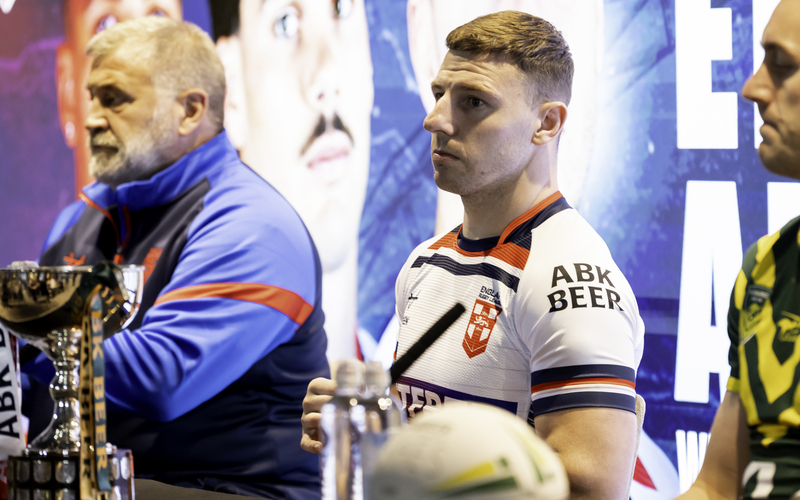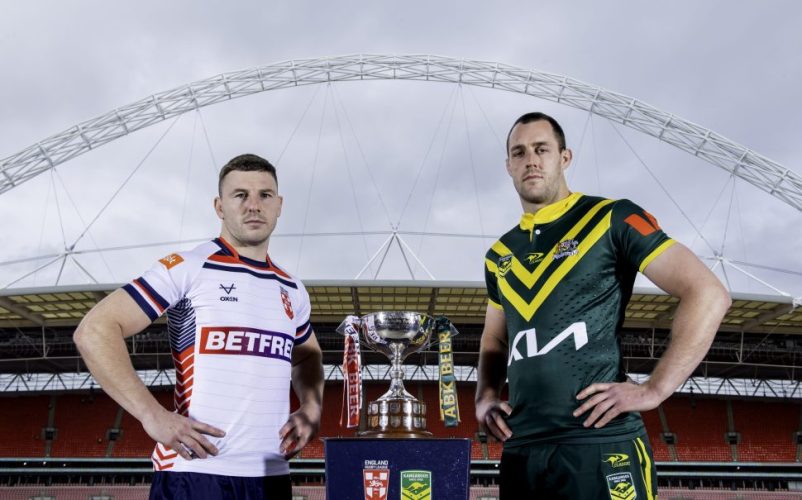The rugby league Ashes returned after a two-decade long absence. But, writes Dylan McLaren, for the new generation, it was a familiar tale…
In the 8,008 days between the previous rugby league Ashes series and the current one, the world has changed dramatically.
Eight prime ministers, a global pandemic, Tottenham Hotspur winning a European trophy, and 10 Fast and Furious films – all in the last 20 years. But Australian Ashes dominance? You would be a fool to think anything in a hundred years could change that.
The first contest in a generation ended as expected with a dominant 26-6 win for the Green and Gold, however for the first time it is only the English who leave heartbroken. As it is no longer Great Britain competing, the rest of the UK can celebrate a glorious English loss on home soil.
But just because we expected England would lose, it does not make it any easier.
Who cares if the salary cap in the NRL is over £1million more than in the Super League? Who is bothered that Australia has 1.3 million more active players than the host nation? You still dream that, against all the odds, the nation you support will do the impossible.
But dreams don’t always come true. The most probable outcome happens, and once again, Australia win an opening match of the series.
Prior to his side’s loss in the capital, England coach Shaun Wane said he needed “15 players having their best ever game,” because of the Kangaroos’ quality. He added, “I believe we have got players who can do that. They know how good they need to be to win, but it’s going to take an arm and a leg.”

And did 15 players have the game of their lives? No. Nobody did. However, you could tell from the off that England were going to give it everything they had. They may not have the born-and-bred quality of the Australian side, but their attitude was exemplary.
When Mikey Lewis took the kick-off, it was the first-time a ball had been touched in the Ashes since Huddersfield in 2003. This aggressive long ball turned out to be a metaphor of the first half.
The record Wembley crowd, as you would hope after so many years, were up for it. Every tackle was celebrated like a try, and even mistakes were not jeered. It’s cliché, but it played out like a game of chess.
Sadly, as the half went on, it switched. The game moved from chess to boxing – and every Australia attempt felt like a jab that slowly weakened England.
Whether it was the size of the crowd, the magnitude of the fixture or adrenaline, the English were not helping themselves. Every time they pushed forward, a sloppy pass would be misplaced, and they would be back to where they started.
Then came the inevitable.
On his international debut, Reece Walsh sunk the dagger into English hearts. His try was the first since Luke Ricketson’s last minute winner in 2003 – Walsh was barely a year old at that time. It was the Australian’s four points that kickstarted England’s slow and painful downfall.
Down 8-0 at the half, Australia’s acting captain Harry Grant told BBC One that the Kangaroos “need to keep it nice and simple in the second half,” which is exactly what they did. While England worked themselves up, continuing to be aggressive but lacking a clinical edge, Australia just kept scoring.
While Angus Crichton dominated the second half, and Nathan Cleary converted anything that came his way, England ran themselves into the ground with misplaced passion. They were physically exemplary, but mentally substandard.
No matter how England played, the way Australia strolled through the second-half makes you feel that even if Australia never moved out of third-gear, they could still win the series comfortably.
Despite all of the negative aspects of the English performance, supporters still had something to cheer about.
When Daryl Clark became England’s first ever Ashes scorer, the record crowd celebrated as if they had won. Images of fathers and sons hugging in the stands flashed on the screen, representing exactly what the series means to fans.
When Clark placed the ball over the line, nothing else mattered.
England’s disappointing second-half display, and the fact the tie had slipped away did not matter. At that moment, England fans got to celebrate something they never thought they would.
@englandrugbyleague 💪 Daryl Clark crashes over the line at Wembley! #EnglandRL ♬ original sound – England Rugby League
Within the celebrations, it did feel as though some of the visiting Aussie faithful joined in. They want drama and passion. Is it really worth travelling half way across the globe to watch your side play three uncontested games?
Before Clark’s 77th minute try, Australia looked as if they would destroy England this series – all three games would be uncontested. However, those points gave England fans and players hope. They know they can score.
There are still two more games, and though the likelihood of England doing something is slim, we can still dream. Could Aussie fans cheer for England? Unlikely. However they will want to see good games of rugby alongside good results. You don’t travel over 10,000 miles to be bored to death.
When the series heads north to Everton’s Hill Dickinson stadium on November 1, the result won’t be forgotten. A 26-6 loss for England will hurt and they know the task in front of them is massive, but they also know they can score.
They know the Aussies just that bit better now.
A handful of wild tactics will be drawn up trying to figure out how to defeat this Australia super team, while that may seem impossible when the loss is still fresh, all we can do is hope. The second-half performance was subpar, but the entire eighty minutes showed passion.
An Ashes win would inspire a generation of rugby hopefuls like nothing else, and if England head to Merseyside feeling more confident but just as passionate, they really could do something special. And if they don’t win, hopefully we don’t have to wait another generation for a second chance.
Featured image: RLPix courtesy of Rugby League Commercial





Join the discussion